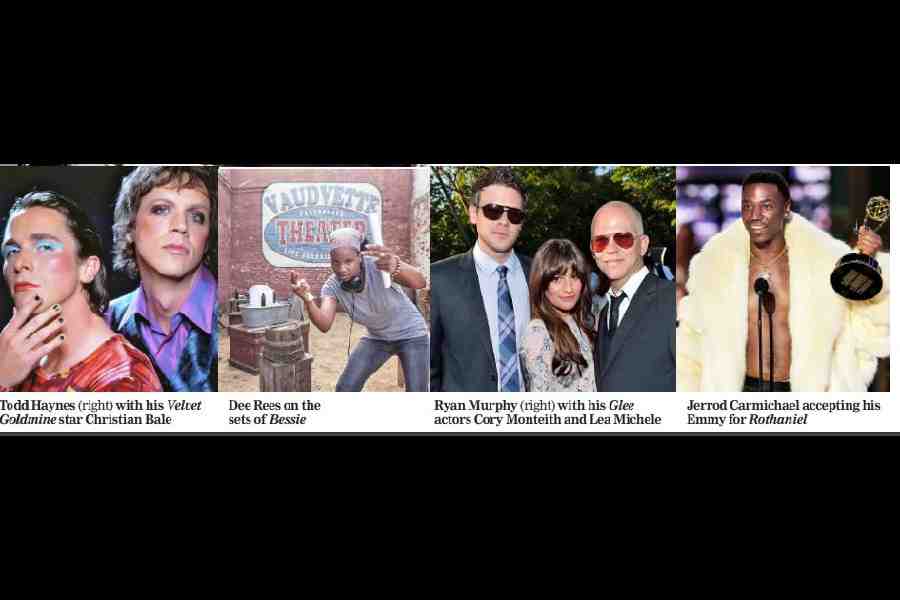Pedro Almodovar
Pedro Almodovar has been openly homosexual for decades now but doesn’t limit himself to being only seen in that light. Instead, he wants his audience, through his movies, to understand the language of love and passion. The Spanish auteur has portrayed sexuality in his films as fluid and contrasting. He has expertly explored nuanced aspects of sexuality and identity in films like Broken Embraces and All About My Mother. He continues to champion such voices in his upcoming short, Strange Way of Life starring Pedro Pascal and Ethan Hawke as two gay cowboys who reunite after being separated for 25 years.
Celine Sciamma
Right from her debut film Water Lilies — which tracks the sexual awakening of three 15-year-old female friends in a middle-class suburb of Paris over the course of a single summer — Celine Sciamma has established herself as an extraordinary voice in queer cinema. Her film-making style is subtle, nuanced and open to interpretation. Her 2020 film Portrait of a Lady on Fire is inarguably one of the finest in this narrow genre of films.
In her movies, characters embark on a journey to find themselves, and by extension, their sexuality. In Portrait of a Lady on Fire, not only does Sciamma focus on a growing relationship between her two women characters, she also explores subjects such as gender roles, male gaze, and female friendship. The film was not just an exploration of same-sex relationships, but also of being a woman.
John Waters
When it comes to queer cinema, John Waters is one of the most talked about film-makers in the community. He has been openly gay and a vocal supporter of gay rights through the years. He first made a splash with his now cult film, Pink Flamingos, which starred the late drag queen Divine as the iconic Babs Johnson.
Waters has been described as ‘culturally, historically and aesthetically significant’ by the Library of Congress, but, conversely, his films have also been banned in certain countries. But that hasn’t deterred the film-maker from expressing himself. Hairspray, released in 1988, is a succinct commentary on society. Waters continues to be an inspiration for many budding film-makers for his fearlessness and sense of humour.
Todd Haynes
Todd Haynes has been an influence on queer cinema since the late ’90s, beginning with Velvet Goldmine. His films, like that of Almodovar, view sexuality as a social construct, while his characters keep getting into conflicts with society over their sexual identity. Haynes likes to portray his characters as artistes first and then as slaves to the social constructs around them, as he did with the character of Brian Slade in Velvet Goldmine. Currently, the director is working on a gay love story set in 1930s Los Angeles, which stars Oscar winner Joaquin Phoenix.
Ryan Murphy
Ryan Murphy had a tough childhood when it came to embracing his sexuality and also meeting the expectations society had of him. From his parents trying to ‘cure’ his homosexuality by taking him to a psychiatrist to being told at the start of his career to not include any LGBTQIA+ characters in his writing, Murphy has fought many an embittered battle in his quest to assert himself and his brand of cinema.
Today, Murphy stands tall on a rock-solid foundation of some critically acclaimed and commercially successful body of work. The film-maker is often credited as depicting the reality of people who are part of the LGBTQIA+ community. In one of his most popular shows ever, Glee, Murphy portrayed his reality through the character of Kurt. One of the most memorable scenes of the show is in S01E04, where Kurt (played by Chris Colfer) comes out to his father. Executed to perfection, the scene takes inspiration from Murphy himself coming out to his father. That episode was revolutionary in 2009, being an honest and straightforward portrayal of an individual owning their sexuality.
Jerrod Carmichael
Starting off as a stand-up comic at The Comedy Store in LA, Jerrod Carmichael slowly started working with the likes of Quentin Tarantino and Spike Lee. During this time, nothing much was known about his private life. But in Rothaniel, a comedy special he did in 2022, Carmichael came out as gay, after struggling with his sexuality for years.
Carmichael has fought the odds, making his directorial debut with On the Count of Three, which tells the story of two friends and the connection they share. In his specials, he has talked about society, race and the Black Lives Matter movement and has pondered about his own place in the societal rat race we are all forced to live in.
Dee Rees
Born in Nashville, Tennessee, Dee Rees has become a groundbreaking presence in queer cinema. Her debut feature, Pariah, was a semi-autobiographical look at a teenager in Brooklyn, and the burden that is placed on the protagonist’s shoulders by the world.
The film received instant critical acclaim and made Rees the recipient of many awards. But no award comes close to the number of young girls who found a voice and representation through that character and her struggle with her sexual identity.
Most of Rees’s work revolves around her characters discovering their sexual identity because she believes that sexuality is a big part of what makes a person an individual. In her HBO show Bessie, she explores the sexuality of blues singer Bessie Smith.










